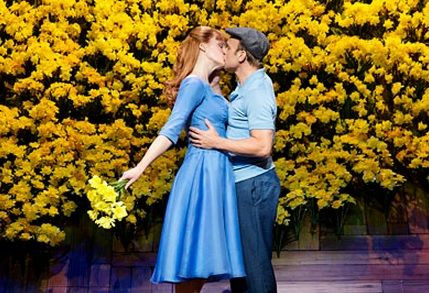‘Big Fish’ The Musical On Broadway Highlights The Promise And Price Of Screen-To-Stage Adaptations

At some point during the home stretch of the new musical “Big Fish,” you realize that you are experiencing one of those rare moments in modern Broadway when all the elements come together as they should. The chemistry of the cast, the versatility of Julian Crouch’s hyper-real set design and the energy of Andrew Lippa’s final number seamlessly coalesce around the story of a hopeless pragmatist struggling to reconcile fact with fiction in the fantastical tales told by his dying father.
“Big Fish” is adapted by John August from his own screenplay, which he wrote for Tim Burton’s 2003 film. The screenplay itself was adapted from Daniel Wallace’s 1998 novel. It’s not a perfect show: Lippa appears to phone in much of the score, particularly the slower numbers, which seem to plod along for the sake of killing time. But despite such lulls, the musical is a generally satisfying and even enriching theatrical jaunt, at once touching and entertaining. While it’s too early to tell if those creative victories will translate into commercial success (the show earned a respectable $841,498 during its second week, according to Broadway World), the musical sings volumes about the potential -- and limitations -- of movie-to-stage adaptations on the Great White Way.
Over the last decade or so, Broadway producers began taking a cue from their counterparts in Hollywood, realizing that the only way to minimize financial risk and entice people into seats is to produce shows with built-in audiences. And just as today’s movie business subsists almost entirely on superhero franchises and unnecessary remakes, Broadway in the 21st century has been largely condensed into a homogenized pool of revivals, jukebox musicals and adaptations. Of the top 15 first-run productions currently on the boards, only one -- “The Book of Mormon” -- is not based on preexisting material.
As a business strategy, this model seems to be working. Coupled with the never-ending trend of pushing ticket prices upward, it’s helped more shows recoup their production costs in a segment where the chances of profitability are notoriously low. Star power helps, too, but less and less so. Last season Tom Hanks (“Lucky Guy”) and Bette Midler (“I’ll Eat You Last”) significantly boosted their respective shows’ bottom lines, but Scarlett Johannson (“Cat on a Hot Tin Roof”) and Alec Baldwin (“Orphans”) couldn’t do much to save theirs. At the same time, “Matilda,” a musical based on a children’s book that was also a movie, became one of the biggest successes of the year, raking in more than $37 million since it opened in March. Is it any wonder why Broadway producers are mining Hollywood’s recent past for material?
And yet the adaptation approach can be equally ruthless. Like Hollywood’s superhero-blockbuster machine, it can trick producers into relying too heavily on an audience’s familiarity with the source material, which alone has never been enough to save a seriously flawed production. Last season’s ill-fated “Leap of Faith,” based on the 1992 Steve Martin film about a charismatic con artist posing as an evangelical preacher, must have looked pretty good on paper. But someone made the fatal error of casting Raúl Esparza in the Martin role. Esparza is a Broadway favorite and a huge talent, but he lacked the dynamic energy the role called for. His through-the-fourth-wall sermonizing was both tedious and strained, and when a lead actor looks as if he wished he hadn’t shown up, the audience is going to feel the same way.
In contrast, Norbert Leo Butz and Bobby Steggert, who play Edward and Will Bloom in “Big Fish,” share a terrific chemistry at the Neil Simon Theatre, buttressed by their believable father-son bickering and warm exchanges. Add to that Crouch’s colorful sets, Donald Holder’s vivid lighting design and William Ivey Long’s imaginative costumes, and you have a finished product that captures the essence of Tim Burton’s signature whimsy without using it as a crutch. Where the show fails to transform into greatness is perhaps a failing of movie-to-stage adaptions in general: That gnawing feeling that you have not seen something entirely new.
For theater-lovers, stage occupies a higher place than movies on the entertainment totem pole. When Broadway borrows material from Hollywood, it may always, to some extent, feel like a step down. “Big Fish” makes that downgrade as painless as possible, and the residual joy is far better than yearning futilely for a time when Broadway was a place of original ideas. If it can adapt, maybe we can too.
Got a news tip? Email me. Follow me on Twitter @christopherzara
© Copyright IBTimes 2024. All rights reserved.






















